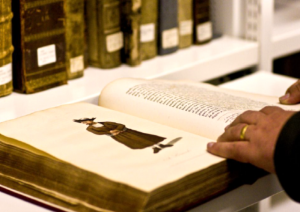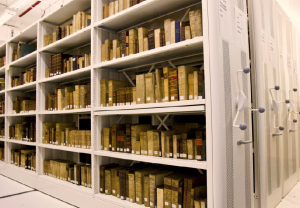King’s Careers met with Katie Sambrook, who is the Head of Special Collections & Engagement at Foyle Special Collections Library. Dipping through topics such as her career journey, to what her department looks for in applicants, we had the privilege to learn about her job in this fascinating sector.
Situated in a beautiful nook of the historic Maughan Library on Chancery Lane, Katie’s offices are next to the Special Collections reading room. King’s students, staff and all members of the public are free to consult material in their collections – this means there is usually a few readers reading historical books nearby, deciphering documents or admiring illustrations. The Foyle Special Collections Library houses around 200,000 items, mainly printed works, but also maps, manuscripts and illustrations dating between the 15th century and present day. So, how do you get into a workplace like this?
 Katie’s Career Journey
Katie’s Career Journey
Katie studied English literature at the undergraduate level and got her Masters in Library Studies. “Many people who end up working in Special Collections have had some inspirational visit or encounter that may have inspired them”, Katie tells. For her, it was through a module called “History of the Book” during her Masters, where a study trip to a Special Collections Library led her to think about a career with rare books, manuscripts and special collections.
What’s her role like?
Katie tells us about her role at King’s: she leads a team of 9 staff members, ranging from collections managers to library assistants. The team also benefits from annual student interns from King’s Department of History.
Working in a small team means doing a bit of everything. “ Leading a team of staff, overseeing the management and development of our collections and services, curating exhibitions, , managing and bidding for funds, teaching students and participating in wider collaborative projects in research, cataloguing or digitisation are the general areas that I am involved in”, Katie tells, “whereas many large institutions may have big teams and very specified roles, our relatively small team at the Foyle means we all share a variety of tasks.”
Surprising sides of Katie’s work
As well as visiting researchers, the team at the Foyle often hosts visiting Special Collections librarians from other countries. “We had colleagues from Helsinki’s national and university libraries visit recently”, Katie tells. “We have a lot of material in our collections that are in other languages or from other countries – and always bring some items out for our foreign colleagues.”
Another interesting, even bit of a star-studded side of the job is managing visits from film crews. Whether it’s a documentary about a specific item or an interview regarding a topic in their collection, Katie and her team often collaborate with film and TV companies.

What skills do students need to make it in this job?
“A high regard to accuracy and detail”, Katie describes. “Communication skills are important – to explain something to our readers, as well as negotiate with Estates about what kind of temperature our collections need to be stored in or explain to visiting film crews how they can best interact with our historical items. You need to be able to work with a wide range of people and to communicate with a range of audiences.

If you wanted to apply for work in this sector, Katie recommends that applicants should showcase a proven interest: “this could be previous work, volunteering at special collections, anything proactive”. Also, a masters in Librarianship or Archives is usually desirable if you want to go beyond entry-level jobs. Lastly, Katie recommends applicants to showcase their unique knowledge, attributes, skills and experience – knowledge of and interest in history, skills in teaching, or foreign language skills can turn into special advantages in this sector!
Katie sums up the rewards and attractions of her role: “You work with interesting and important collections and with interesting people. There is plenty of scope to develop project and initiatives, to innovate and to build partnerships with a range of educational and cultural organisations in the UK and further. It’s a collaborative profession with a strong network of peer support. The work has great variety and you have the satisfaction of knowing that you are doing something of lasting value.”
Feeling inspired? Explore King’s Careers guides about career pathways in Information, Libraries and Museums! If you are looking for a route into the world of Special Collections, this guide is an excellent place to start: we have included role profiles, listed job sites and various industry networks for you to get started with your career journey and learn about current industry insights!